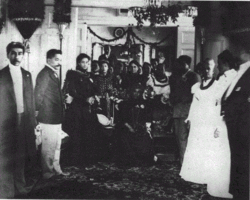The National Security Agency and the Federal Bureau if Investigation was given authorization by a judge with the top-secret Foreign Intelligence Surveillance Court to spy on five Americans because of their political activity and, umm, their Middle Eastern names:
Meet the Muslim-American Leaders the FBI and NSA Have Been Spying On
By Glenn Greenwald and Murtaza Hussain
he National Security Agency and FBI have covertly monitored the emails of prominent Muslim-Americans-including a political candidate and several civil rights activists, academics, and lawyers-under secretive procedures intended to target terrorists and foreign spies.
According to documents provided by NSA whistleblower Edward Snowden, the list of Americans monitored by their own government includes:
• Faisal Gill, a longtime Republican Party operative and one-time candidate for public office who held a top-secret security clearance and served in the Department of Homeland Security under President George W. Bush;
• Asim Ghafoor, a prominent attorney who has represented clients in terrorism-related cases;
• Hooshang Amirahmadi, an Iranian-American professor of international relations at Rutgers University;
• Agha Saeed, a former political science professor at California State University who champions Muslim civil liberties and Palestinian rights;
• Nihad Awad, the executive director of the Council on American-Islamic Relations (CAIR), the largest Muslim civil rights organization in the country.
The individuals appear on an NSA spreadsheet in the Snowden archives called “FISA recap”-short for the Foreign Intelligence Surveillance Act. Under that law, the Justice Department must convince a judge with the top-secret Foreign Intelligence Surveillance Court that there is probable cause to believe that American targets are not only agents of an international terrorist organization or other foreign power, but also “are or may be” engaged in or abetting espionage, sabotage, or terrorism. The authorizations must be renewed by the court, usually every 90 days for U.S. citizens.he National Security Agency and FBI have covertly monitored the emails of prominent Muslim-Americans-including a political candidate and several civil rights activists, academics, and lawyers-under secretive procedures intended to target terrorists and foreign spies.
According to documents provided by NSA whistleblower Edward Snowden, the list of Americans monitored by their own government includes:
• Faisal Gill, a longtime Republican Party operative and one-time candidate for public office who held a top-secret security clearance and served in the Department of Homeland Security under President George W. Bush;
• Asim Ghafoor, a prominent attorney who has represented clients in terrorism-related cases;
• Hooshang Amirahmadi, an Iranian-American professor of international relations at Rutgers University;
• Agha Saeed, a former political science professor at California State University who champions Muslim civil liberties and Palestinian rights;
• Nihad Awad, the executive director of the Council on American-Islamic Relations (CAIR), the largest Muslim civil rights organization in the country.
The individuals appear on an NSA spreadsheet in the Snowden archives called “FISA recap”-short for the Foreign Intelligence Surveillance Act. Under that law, the Justice Department must convince a judge with the top-secret Foreign Intelligence Surveillance Court that there is probable cause to believe that American targets are not only agents of an international terrorist organization or other foreign power, but also “are or may be” engaged in or abetting espionage, sabotage, or terrorism. The authorizations must be renewed by the court, usually every 90 days for U.S. citizens. [..]
The five Americans whose email accounts were monitored by the NSA and FBI have all led highly public, outwardly exemplary lives. All five vehemently deny any involvement in terrorism or espionage, and none advocates violent jihad or is known to have been implicated in any crime, despite years of intense scrutiny by the government and the press. Some have even climbed the ranks of the U.S. national security and foreign policy establishments.
[..]
Asim Ghafoor says his first-hand experience working on behalf of other Muslim-Americans has led him to believe that “the U.S. government embarked on a very systematic approach” to target his community.
“I saw the government specifically go after Muslim people who were involved in certain activities such as charity work, humanitarian work, political activism,” he says. “Maybe they had some website that had some speeches that nobody ever read or even noticed, maybe they had some bloodcurdling speeches. So the government just treated you like you were blowing up the next tower. They treated you like you were going to be the Manchurian Candidate, you were going to destroy America from within. There were U.S. attorneys, FBI agents, DHS agents, customs agents all over the country that were trying to find the next terror cell in their midst. If you were involved in those activities and maybe you were on a student visa and you didn’t quite fill out the paperwork, you were hosed. There is no question about it, you were worse off than a migrant worker in Dubai. You were just packed up and sent home. Life became very, very unbearable for them.”
Even a U.S. citizen like Faisal Gill, who served his country both in the armed forces and in the White House, found himself spied on by his own government. “I was a very conservative, Reagan-loving Republican,” he says. “If somebody like me could be surveilled, then [there are] other people out there I can only imagine who are under surveillance.
“I went to school here as a fourth grader – learned about the Revolutionary War, learned about individual rights, Thomas Jefferson, all these things,” he continues. “That is ingrained in you – your privacy is important. And to have that basically invaded for no reason whatsoever – for the fact that I didn’t do anything – I think that’s troubling. And I think that certainly goes to show how we need to shape policy differently than it is right now.”
As per Huffington Post‘s Ryan Grim, Glenn Greenwald received the permission of all five named in the article before printing their names.
This is the Democratic administration of Barack Hussein Obama.





Recent Comments